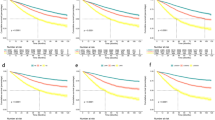Abstract
Methods of prognostic stratification for patients with rectal cancer currently rely solely on the extent of tumor penetration in the surgically excised rectum. Thus stratification according to prognostic factors can be performed only after treatment has been carried out and can play no role in pretherapeutic treatment decisions or in the design of trials of preoperative adjuvant treatment. To devise a method of clinical prognostic staging that could be applied to all patients with rectal cancer, regardless of therapy, the medical records were examined of an inception cohort of 282 patients treated by surgical and nonsurgical methods at three Toronto hospitals during the years 1968 to 1974. Six groups of clinical variables were identified that independently influenced prognosis: the presence or absence of metastatic disease, whether the rectal tumor was fixed or mobile, an annular rectal tumor, and the systemic symptoms of weight loss, anorexia, or weakness, and anemia. A composite method was developed for clinical prognostic staging from these variables and it was found that it created substantial gradients in survival. In patients treated by surgery, for whom comparisons of clinical staging with conventional anatomic staging were possible, clinical staging was as effective a method of prognostic staging as was anatomic staging. Furthermore, the prognostic impact of clinical staging persisted after adjustment for the effects of anatomic staging. This method of clinical prognostic staging should prove useful in making therapeutic decisions and in the design and analysis of clinical trials of alternative treatment for patients with rectal cancer.
Similar content being viewed by others
References
Kirklin JW, Dockerty MB, Waugh JM. The role of the peritoneal reflection in the prognosis of carcinoma of the rectum and a sigmoid colon. Surg Gynecol Obstet 1949;88:326–31.
Feinstein AR, Schimpff CR, Hull EW. A reappraisal of staging and therapy for patients with cancer of the rectum. I. Development of two new systems of staging. Arch Intern Med 1975;135:1441–53.
Peto R, Pike MC, Armitage P, et al. Design and analysis of randomized clinical trials requiring prolonged observation of each patient. II. Analysis and examples. Br J Cancer 1977;35:1–39.
Davies GC, Ellis M. Radical surgery in locally advanced cancer of the large bowel. Clin Oncol 1975;1:21–6.
Buckwalter JA Jr, Kent TH. Prognosis and surgical pathology of carcinoma of the colon. Surg Gynecol Obstet 1973;136:465–72.
Boyd NF, Cummings BJ, Harwood A, Rider WD, Thomas G. Observer variation in the assessment of patient with rectal cancer. Dis Colon Rectum (in press).
Arnaud JP, Joehl C, Adloff M. Carcinomembryonic antigen (CEA) in diagnosis and prognosis of colorectal carcinoma. Dis Colon Rectum 1980;23:141–4.
Ege GN, Cummings BJ. Interstitial radiocolloid iliopelvic lymphoscintigraphy: technique, anatomy and clinical application. Int J Radiat Oncol Biol Phys 1980;6:1483–90.
Kressel HY, Callen PW, Montagne JP, et al. Computed tomographic evaluation of disorders affecting the alimentary tract. Radiology 1978;129:451–5.
Carbone PP, Kaplan HS, Musshoff K, Smithers DW, Tubiana M. Report of the committee on Hodgkin's disease staging classification. Cancer Res 1971;31:1860–1.
Charlson ME, Feinstein AR. A new clinical index of growth rate in the staging of breast cancer. Am J Med 1980; 69:527–36.
Peter JL, Loeb M, Siu TO. A multivariate analysis of the contribution of “auxometry” to prognosis in breast cancer. J Chron Dis 1979;32:375–84.
Boyd NF, Meakin JW, Hayward JL, Brown TC. Clinical estimation of the growth rate of breast cancer. Gancer 1981; 48:1037–42.
Feinstein AR. Symptoms as an index of biological behaviour and prognosis in human cancer. Nature 1966;209:241–5.
Feinstein AR, Schimpff CR, Andrews JF Jr, Wells CK. Cancer of the larynx: a new staging system and a re-appraisal of prognosis and treatment. J Chron Dis 1977;30:277–305.
Author information
Authors and Affiliations
About this article
Cite this article
Zorzitto, M., Germanson, T., Cummings, B. et al. A method of clinical prognostic staging for patients with rectal cancer. Dis Colon Rectum 25, 759–765 (1982). https://doi.org/10.1007/BF02553307
Received:
Issue Date:
DOI: https://doi.org/10.1007/BF02553307




